|
|
|
Chapter 1 | Chapter 2 |
The Kidhood of
Billy the Kid
A Most Merry and Illustrated History of a Most Unlikely American Icon
Copyright 2011 Charles F. Cooper
Chapter 3 - Home Sweet Lincoln County
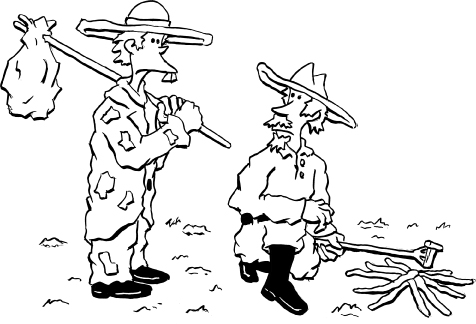
There are about as many stories of Henry McCarty arriving in Lincoln County as there are people telling them. The truth, though, is it took Henry a while to wind his way to what was then the largest county in the United States. Lincoln County was, in fact, larger than Rhode Island, and it was only later that the area was broken up to where it now includes areas in Chaves, Lea, Eddy, De Baca, Otero, Roosevelt, Soccoro, Torrance, and Curry counties.
When Henry first left Arizona he had been wayward confused kid, who panicked because he had been caught stealing some clothes. He returned to New Mexico as a wayward confused kid who was wanted for murder. As before he got buy doing what he could, working at odd jobs, around the ranches, and hanging around towns. In town he tended to wind his way to the saloons and associate with the rougher elements. It was also in saloons where he could refine his gambling skills which, as any smart gambler knows, means he would act as the banker. Henry particularly liked Spanish monte particularly if he didn't have to pass the deal.
Sometime after his return to New Mexico Henry began calling himself Billy. For a while we read mixtures of references where the names Henry and Billy are tossed back and forth, but soon Billy was his name of choice. But among the men he met, he was just "Kid." His most famous tag, "Billy the Kid", wasn't used for quite a while and only after it was invented by a news writer.
That Billy would adopt an alias makes a lot of sense, and on his return, for the first time we hear him using the name Bonney. It's been speculated that Bonney was a family name - possibly the name of his real father. On the other hand it may have been the name of a fictional hero that appeared in popular dime novels. But Billy never entirely abandoned his legal name, Antrim, particularly in official proceedings (like murder trials), although he would point out that Antrim was his stepfather's name.
The chronologies of Billy's early days in Lincoln County are confused and dates uncertain. One of the first reports of Billy (with the Bonney surname) was when he showed up at the ranch of Barbara Jones in mid-October, 1877. Barbara's ranch was near Seven Rivers which she ran with her husband, Heiskell. Barbara - called "Ma'am" Jones by her many friends - woke one morning hearing furtive noises outside her house. Grabbing a gun she pointed it through one of the gun-ports and shouted for whoever it was to come out.
Instead of a masked desperado, out of the darkness stepped a young skinny kid, who had small hands and feet and - as Ma'am and others always seemed to always notice - two protruding front teeth. This was a kid, Ma'am realized, who had no business being out on his own. He obviously needed help, and Ma'am took charge and administered to his needs. She immediately ordered Billy to take off his boots and put his feet in a tub of hot water. She handed him a glass of milk which he ignored until she said she would hold his nose and pour it down his throat. When Ma'am asked the kid where he was from, he said he had escaped from a band of Apaches (unlikely) and had been walking for three days. He said his name was Billy Bonney.
Billy - as we'll continue to call him - hung around for a while - perhaps a couple of weeks, perhaps a few months - helping out on the ranch. Among Ma'am Jones kids were two sons, Sam and John, who figured tangentially in Billy's later life. For the rest of her long life, Ma'am Jones spoke well of Billy
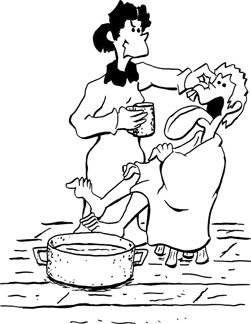
Naturally, other families reported that Billy showed up at their homes and that they helped him out. Since Billy was literally bumming around there's no reason to doubt them. The family of a one established businessman and rancher named William Brady always said that William had put Billy up for a while. If true, the hospitality shown by the Brady family in general and William in particular is ironic indeed. as we will see.
Billy also stopped at the ranch of George Coe, who owned a ranch and farm near Fort Stanton. George worked the ranch with his cousin Frank, and both were well established figures in Lincoln County. The Coes, in addition to farming and ranching, were in demand as fiddlers for the local dances, the bailes, which Billy naturally took to.
George and Frank got to know Billy well. Frank tells us that Billy was seventeen when they met him, but looked a young fourteen. As at Ma'am's, Billy hung around the place for a while. Billy helped out by cooking for the men,, but Frank said he was too small and slight to do any real work. Eventually he wandered off. But Billy and the Coes would meet again.
Frank's remarks give us another opportunity to pause a moment and consider Billy's age in more detail. If Frank is correct, then Billy would indeed have been born in 1859, a date which agrees with the official birthdate we get from Ash Upson. However, Frank's interview was given more than 40 years after the events, and likely Frank had read the book. But at the time Frank saw a fourteen year old kid whose boyish good looks and fetching grin immediately brought out the mothering instinct in older women, less mothering instincts in the young señoritas, and a condescending tolerance in older men.
Everyone seems to have remarked on Billy's youth, his slight stature, and of course, his two protruding front teeth. Usually the way out of the dilemma of Billy's claimed age (which in 1880 he said was twenty-five) compared to his youthful appearance is to simply say that Billy just looked much younger than his years. After all, everyone knows people who look twelve when they're really thirty, and so why can't that be true of Billy?
But as late as 1878 a newspaper reporter mentioned it looked like Billy didn't even shave and had only the traditional "school boy fuzz" above his upper lip. And a woman who remembered Billy in Silver City said Billy was nine years old when his mother died in 1874. So the obvious conclusion is that Billy really was much younger than he claimed, possibly between fourteen or sixteen when he roamed into Lincoln County. But the "official" birthdate is November 23, 1859, if anyone should ask. With Billy's youth and genial personality, he could always find a place to stay and get a meal. Inevitably he was polite and respectful. Frank Lesnett had moved from Chicago to the Ruidoso Valley in 1876 and his wife, Annie, followed shortly after. She had been surprised at the ranch. Instead of being exiled to a land of scrub, dirt, and desert, she found herself living among beautiful hills naturally landscaped with tall pines and multi-colored wildflowers. Frank had purchased a half interest in Dowlin's Mill on the Ruidoso (a mill, by the way, which is still there) and had built a hotel and general store. Edith insisted on taking charge of running the hotel and the store, and her customers were mostly the neighboring ranchers and the Indians from the nearby Mescalero reservation. Billy would show up from time to time, and Annie remembered him playing with the kids (and even holding her infant daughter) and taking the older kids for rides on his horse. She said he also had a dog who he had trained to chase after the puffs of dust when he fired his pistol on the ground. So not only can we accept that Billy really was kind to children and liked animals but he also was the first to discover the principle behind the laser toy. The dog, Annie said, thought the game was great fun, not realizing that a misplaced bullet would end the game abruptly. Annie's story also shows us that even at a fairly tender age, Billy had become the proverbial good shot. Others remembered Billy's skill with firearms and even Pat Garrett, while discounting to the Kid any superhuman feats of marksmanship, admitted Billy was as good as most practiced gunmen and could shoot well under pressure. Pat's definition of good shooting, by the way, was hitting a 1 1/2 inch target two out of five times as fifteen paces, something Pat said he could do if he took careful aim and did his best.
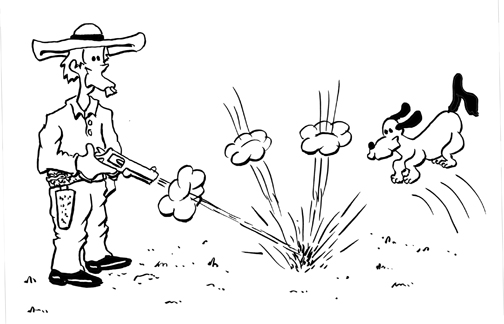
Billy usually didn't hang around ranches too long. A strong work ethic was never his strong point, and he preferred to get his cash - and cartridges we must add - by gambling. The towns in New Mexico in that era were often so in name only with perhaps a store and a boarding house to house the travelers. The - quote - "big cities" - unquote - like Lincoln might have a store or two plus various residences near by. Of course, there was the ubiquitous saloon, and so with Billy's usual mode of operation it was inevitable that he would begin to pal around with Jesse Evans and the Boys.
The Boys were the first bonafide outlaw gang that Billy joined. They were a true band of desperados who rustled cattle and stole horses on a truly commercial and enterprising scale. But they would also enjoy bouts of respectable work as being ranch hands for whoever would pay them. So they might be working on the ranch of John Chisum, the cattle baron of New Mexico, one week and where part of their job description would be supplementing Old John's herd from the smaller ranches near by. Or they might be stealing cattle from John and selling them to local businessmen such as L. G. Murphy.
Jesse Evans was the undisputed leader of the Boys. In his mid-twenties when he met Billy, Jesse had no hesitating shooting anyone if there was a reason, and when you get down to it, he really didn't need much of a reason. His relations with the authorities was complex. He might serve as on a posse with his Boys one day and be hunted by a posse headed by the sheriff the next. What really brought him notoriety was when he was arrested and thrown in the Lincoln County jail. At the time the jail was simply a hole in the floor of the sheriff's office and entered by a trap door. A number of the Boys rode up one night and at gunpoint freed Jesse and all the other prisoners. Among them was Billy.
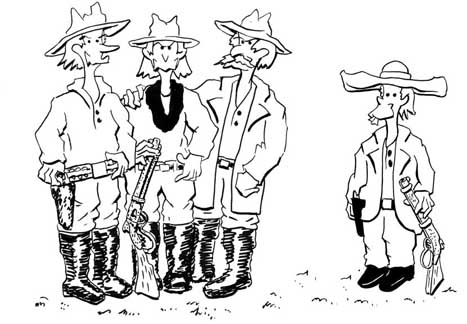
Billy ran with the gang intermittently, and he was never wedded to any one group. He also got into livestock rustling as an independent businessman. Billy's usual method was he and his buddies would raid the herd and if a local buyer thought the goods too hot and refuse to buy them, he would run them down to Mexico. The lengths of the stays were usually brief, but one of his friends remembered once he was gone for several months. Soon Billy could speak Spanish like a native, a skill that would serve to him in good stead.
Of course, if you steal cattle or horses, you turn the best profit if you steal from the large scale ranchers who have a never ending supply of the beasties. But the drawback is the cattle barons are also the ones who can pay the lawmen extra bonuses and bounties to apprehend the criminals. So it wasn't long before Billy once more found himself in jail for rustling from the ranch of John Tunstall, a young Englishmen then only twenty-four years old. John had come to New Mexico to make his fortune, and having been bankrolled by his wealthy father had purchased a large ranch and a large herd of cattle. But when John came to town to see about the prosecution, he actually visited the Kid in the jail. Whatever Billy said, - it was probably just an outline of his life - John had Billy set free. He even hired Billy as a ranch hand, and the rest, as they say, will be history.
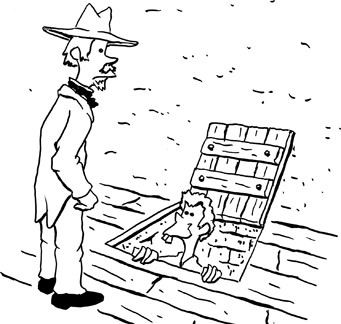
Coming Soon: Chapter 4
Insurgency and Life Insurance in Lincoln County